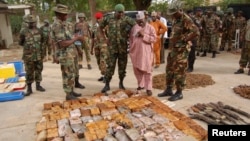Analysts say numerous factors have made West Africa an attractive target for Hezbollah, a Shi'ite extremist group founded in Lebanon.
The presence of the extremist group in the region came into the spotlight this week after the United States announced it was imposing sanctions on four Lebanese citizens accused of aiding Hezbollah in its efforts to expand in West Africa.
The U.S. considers Hezbollah a terrorist organization.
The U.S. Treasury Department said Tuesday that the four men helped Hezbollah broaden its reach in Sierra Leone, Senegal, the Ivory Coast and Gambia.
Richard Downie, Deputy Director of the Africa Program at the Center for Strategic and International Studies, says weak government policies in these countries work to Hezbollah's advantage.
"This is a set of countries that are undergoverned — ill-governed in some respects. Their security services are weak. Their police capability is pretty low, so there are opportunities there for transnational organized criminals to take advantage, and that seems to be the theme of what’s happened," he said.
Downie says Hezbollah has also received support from the region's Lebanese communities.
“In West Africa, there is actually a fairly large Lebanese community," he said. "It dates back a century or more. Many of them are Shi'ite Muslims and so there is a community there that Hezbollah is able to target."
Wahied Wahdat-Hagh, a senior fellow at the European Foundation for Democracy, says Iran, which has traditionally provided Hezbollah with substantial support, has been using the militant group to further its own regional interests.
“Hezbollah’s role has to be seen only in context of the interests of Iranian foreign policy and Iranian military strategy in the Near East and in Africa," he said. "The Iranian influence [has grown] in the last years and the main interest is smuggling weapons and recruiting soldiers."
In a separate development, three Lebanese men who were arrested in Nigeria on suspicion of being Hezbollah members have announced they are suing the Nigerian government for more than $6 million for unlawful incarceration.
The three men were arrested in the city of Kano last month. They say they have not been formally charged with any offense.
The presence of the extremist group in the region came into the spotlight this week after the United States announced it was imposing sanctions on four Lebanese citizens accused of aiding Hezbollah in its efforts to expand in West Africa.
The U.S. considers Hezbollah a terrorist organization.
The U.S. Treasury Department said Tuesday that the four men helped Hezbollah broaden its reach in Sierra Leone, Senegal, the Ivory Coast and Gambia.
Richard Downie, Deputy Director of the Africa Program at the Center for Strategic and International Studies, says weak government policies in these countries work to Hezbollah's advantage.
"This is a set of countries that are undergoverned — ill-governed in some respects. Their security services are weak. Their police capability is pretty low, so there are opportunities there for transnational organized criminals to take advantage, and that seems to be the theme of what’s happened," he said.
Downie says Hezbollah has also received support from the region's Lebanese communities.
“In West Africa, there is actually a fairly large Lebanese community," he said. "It dates back a century or more. Many of them are Shi'ite Muslims and so there is a community there that Hezbollah is able to target."
Wahied Wahdat-Hagh, a senior fellow at the European Foundation for Democracy, says Iran, which has traditionally provided Hezbollah with substantial support, has been using the militant group to further its own regional interests.
“Hezbollah’s role has to be seen only in context of the interests of Iranian foreign policy and Iranian military strategy in the Near East and in Africa," he said. "The Iranian influence [has grown] in the last years and the main interest is smuggling weapons and recruiting soldiers."
In a separate development, three Lebanese men who were arrested in Nigeria on suspicion of being Hezbollah members have announced they are suing the Nigerian government for more than $6 million for unlawful incarceration.
The three men were arrested in the city of Kano last month. They say they have not been formally charged with any offense.





